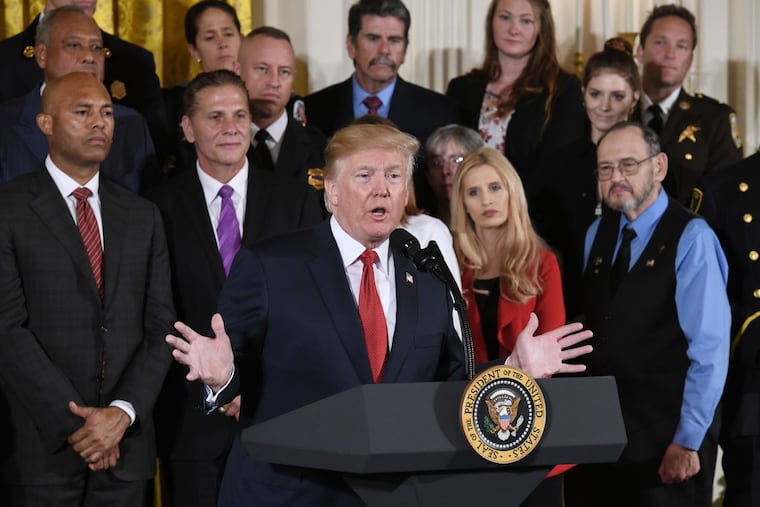In Philly region, Trump's opioid statement prompts hope, skepticism
"This epidemic is a national health emergency," said President Donald Trump.

In the Philadelphia region, where thousands die each year of drug overdoses, President Trump's declaring the opioid crisis a public health emergency was greeted Thursday with some wary hope and plenty of skepticism.
All agreed that until more details are revealed, it's hard to know what the statement will mean locally.
Those who know the crisis through their own hard experiences also were disappointed that Trump didn't announce substantial new funding.
"These people need help. They need rehab. They need treatment, but there's no more money. He's treating us like Puerto Rico," said Barry Salop, 51. The Wynnewood resident, in recovery from opioid addiction for nearly four years, is now a chef at a recovery center.
John Machen, 64, of Royersford, has also battled opioid addiction and lost daughter Stephanie to an overdose. He said the most beneficial thing Trump did in his speech was call more attention to the epidemic.
"He needs to put together a committee of people who have been involved in the battle and who can figure out what needs to be done, how much it will cost, and how to get it done," Machen said. "Experienced people, not bureaucrats. I would rather see those people make the decisions than the governor of New Jersey." Gov. Christie is chairman of the president's opioid commission.
Law enforcement and emergency service officials noted that this is one emergency that is nothing new.
Still, "I'm glad someone is calling it an emergency," said James McCans, director of emergency medical services for Haverford Township. "It's been an emergency for quite a while."
So far this year, first responders in Haverford Township have reversed 101 overdoses using $4,000 in naloxone, the life-saving opioid antidote. New approaches and more money are needed in the fight against opioids, McCans said, but he questioned one of the Trump administration's proposals, drug treatment via telemedicine.
"How are you going to instruct them and get them to do it?" he wondered, pointing out internet access could be an issue.
Michael J. Chitwood, superintendent of police in Upper Darby Township, said the announcement was a good step. But much more is needed to stop the crisis, he said.
"If you don't put these guys who sell death away, educate children in the third grade, and do rehab, it just won't happen, in my opinion," Chitwood said.
Gov. Wolf was among those who observed a conflict between Trump's concern over the epidemic and his position on the Affordable Care Act's expansion of Medicaid, which has proved a major source of funding for drug treatment.
"Well, the president's against that," Wolf said during a visit to Philadelphia. "So there is sort of a disconnect." Overall, he said, "there is really not much in the way of money" in Trump's proposal.
In Philadelphia and the seven surrounding counties, more than 1,300 people have died of overdoses in the first half of the year, a 50 percent jump compared with a year earlier. The increase is largely fueled by fentanyl, a powerful synthetic opioid that is up to 50 times stronger than heroin and 50 to 100 times more potent than morphine.
Given the power of opioids, "it is hard to recover on an outpatient basis," said Deb Beck, president of the Drug and Alcohol Service Providers Organization of Pennsylvania. She hopes Trump will adopt the recommendation from the Commission on Combating Drug Addiction and the Opioid Crisis — led by Christie — and increase funding to expand beds in licensed residential drug and alcohol treatment facilities.
Arthur C. Evans, the city's former behavorial health commissioner, who cochaired Kenney's Opioid Task Force and is now CEO of the American Psychological Association, praised the president's move as "the right step." But he, too, is waiting for details, including what the administration intends to do with health-care reform.
"I'd like to see how the president is going to get additional resources, because that will be critical," Evans said.
His appraisal was glowing compared with that of Scott Burris, professor at Temple University's Beasley School of Law and director of the Public Health Law Research program.
"Donald Trump and the administration need to support access to health care and fund access to health care," said Burris, who called the president's move "political fantasy."
Ian Stoddart, a battalion chief at Narberth Ambulance, watched his own son overcome an opioid addiction.
"It was a classic case," Stoddart said of his son, a Temple University student when he was mugged on Broad Street and ended up with broken ribs, a prescription for Percocet, and a yearlong battle with the drug. "It was horrible."
Without proper support and programs, nothing will fix the problem, he said. "We save lives, then they leave, and we know we are going to see them in a week or two," he said.
The attention the administration has given to the crisis is good, but he hopes it is not a "fluff" statement, he said.
"Ultimately it comes down to money and beds," Stoddart said.
Staff writers Rita Giordano, Don Sapatkin, Andrew Seidman, and Julia Terruso contributed to this article.